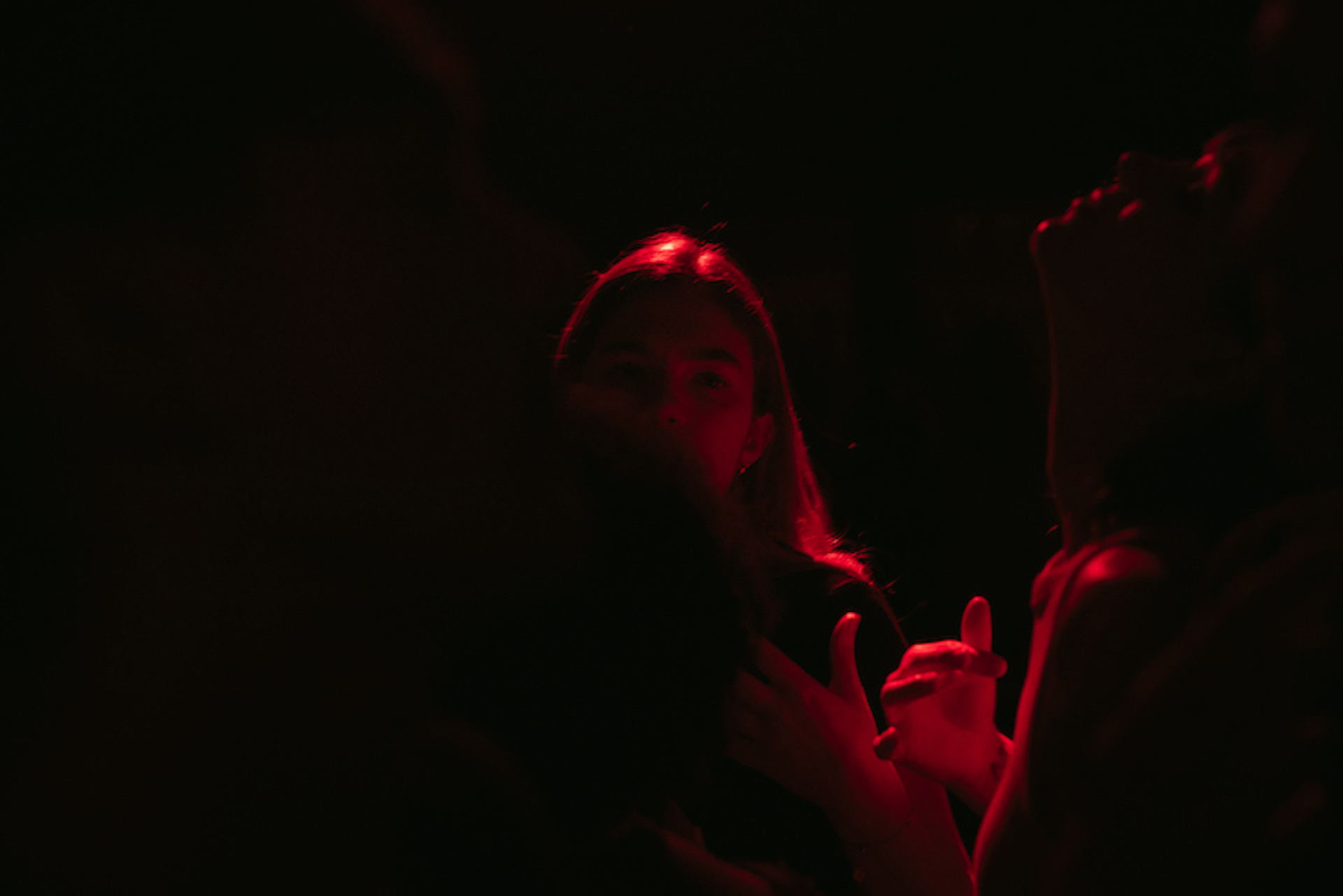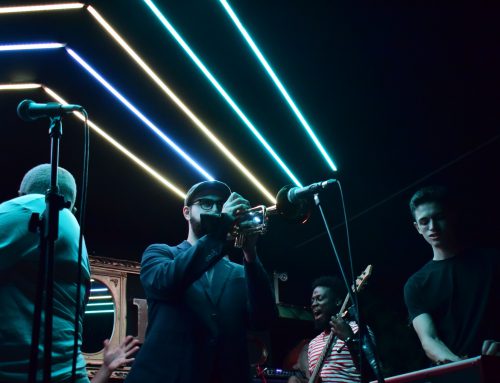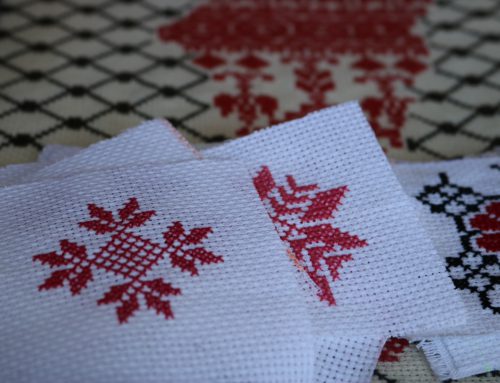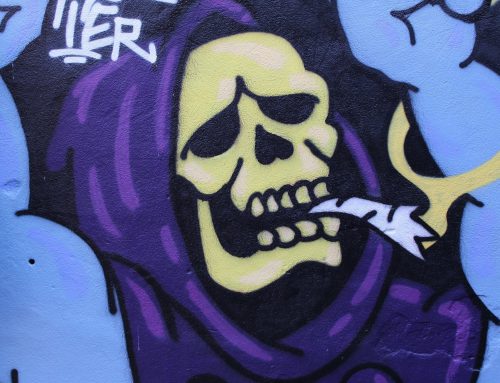BY Ivan de Jacquelin & Paul Riopel
In a whirlpool of strobe lights, electronic music and raging dancers, 20 year-old art student Félicie Diaz couldn’t stop smiling. As she and her group of friends danced the night away, a sentiment of victory was floating in the air, amongst less pleasant smells of sweat, smoke and liquor.
“Knowing that the government is helping to create this kind of safe and legal space for our community to gather really made me feel included,” she says.
The event hosted in January at Fonderie Darling in the Cité du Multimedia went smoothly right until 8 a.m.
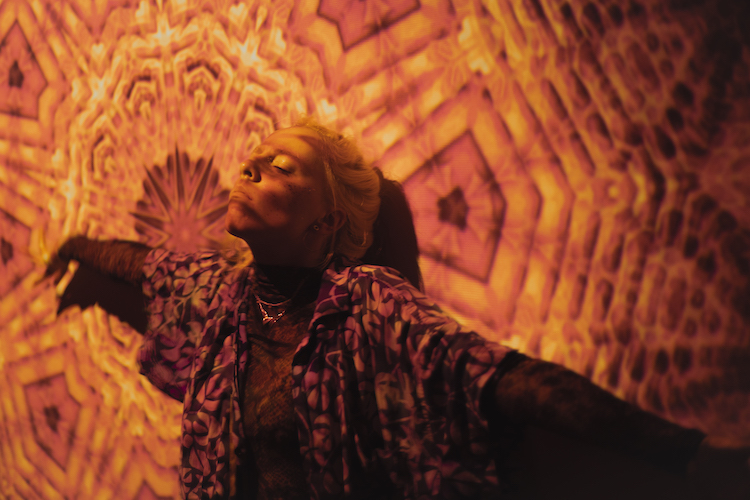
According to Grondin, the electronic music scene suffers the most from the 3 a.m. last call, as people tend to arrive late and leave late at these events, such as this one at bar La Shop. Photo by Ivan de Jacquelin.
Over two months at the beginning of 2023, Montreal sponsored 10 events with special liquor permits allowing drinks to be served all-night-long as part of a pilot project that was launched in the spring of 2022.
“We want everything to be supervised as we aim for a balance with the other functions of our city, such as the residential function,” says Tomas Peltier, the city’s economic development commissioner in charge of the pilot project.
Some of the requirements to get the special licence included that the events had to be carried out by non-profit organisations in partnership with the venue. The applicants also had to show proof that they could ensure the safety of patrons and minimise the impact on the surrounding area.
“We really want our partners to be aware of the impact they have on their ecosystem, so [we’re looking at] if they are communicating with the residents, and can those residents be in contact with the promoter if need be,” said Peltier.
The selected events all took place in either Ville Marie or the Plateau, and were partially financed by the city for up to $50,000 each.
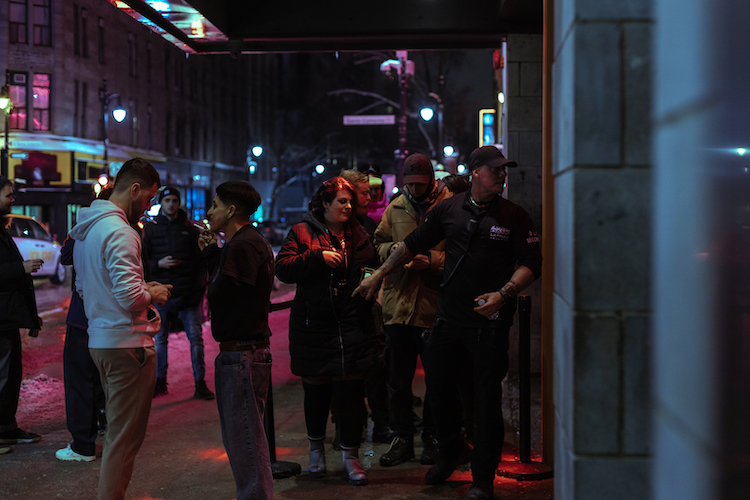
Even past two in the morning, a queue of people was waiting to go in at Club Soda, where the nuit AEX event was held. Photo by Ivan de Jacquelin.
This is not the first time Montreal has tried extending closing times for Montreal bars. Back in 2014, the Quebec Liquor Board shut down ex-mayor Denis Coderre’s pilot project, which allowed 19 bars on St-Denis and Crescent St. to stay open until 6 a.m.
“He didn’t do his homework. He didn’t talk to the transport agencies, he didn’t really talk to local neighbours,” says Will Straw, Professor of Urban Media Studies at Mcgill University whose research focuses on the study of night culture.
Everything changed in 2017, however, when Bill 121 established Montreal as a metropolis, granting it the ability to override many provincial laws.
“For the first time, [Montreal had] the power to control many of its own liquor licensing laws. That’s a big deal because it allowed Montreal to do something. Even if the rest of the province wasn’t ready,” says Straw.
2017 was the same year that Mayor Valerie Plante took office. Among her election promises was the creation of a “Nightlife Policy” that would establish a set of municipal rules to improve the relationship with residents and help develop nightlife in the city.
“There is a municipal will to act on Montreal’s nightlife, and make it more attractive internationally,” says Peltier. In 2019, 2.44 million tourists visited Montreal for its nightlife, according to Tourism Montreal’s annual report. That’s 22 per cent of all visitors. The city hopes to increase that number to 33 per cent, matching the figures (and reputation) of European cities like Berlin (34 per cent) and Amsterdam (31 per cent).
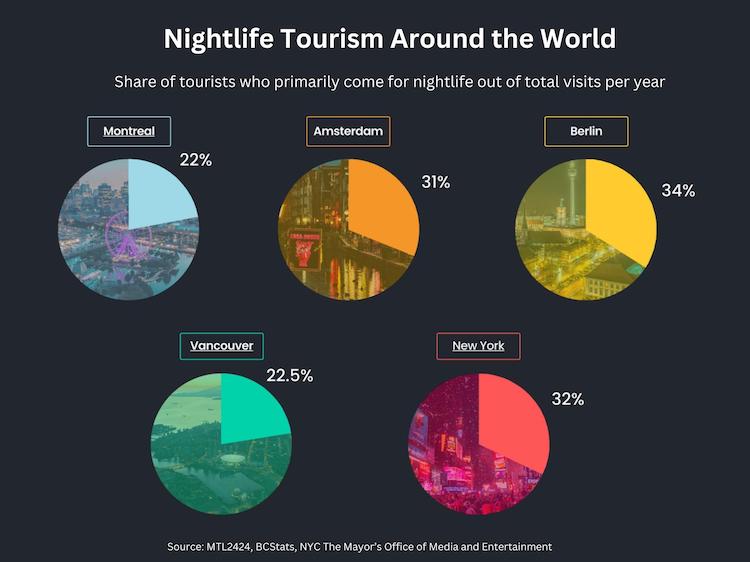
Share of nightlife tourists out of total visits per year. Infographic by Ivan de Jacquelin.
However, the city didn’t come up with this idea on its own. Nightlife activists like Mathieu Grondin, general manager of the non-for-profit group MTL 24/24, have been advocating the change for years.
“Montreal is perceived and sells itself as a party town. It’s been part of our DNA for a hundred years, dating back to the days of prohibition and jazz bars. Up to this day, Montreal prides itself as the festival city,” says Grondin. “But in reality when we compare ourselves to other cities, especially in Europe, we realise that we’re not that avant-garde.”
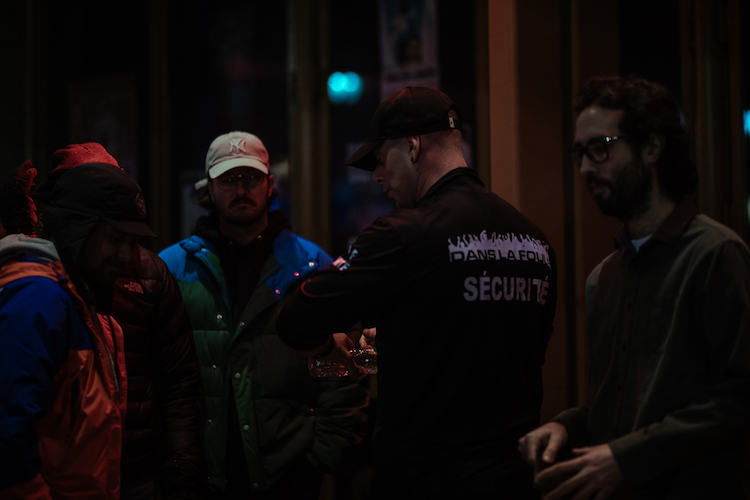
Bouncer empties water bottle in front of nuit AEX’s entrance. Photo by Ivan de Jacquelin.
Launched five years ago by Grondin and two fellow activists, MTL 24/24 helped bring the latest project to life.
“The discussions started three or four years ago,” Grondin says. A consensus started to emerge from a series of reports, studies and citizen consultations: extending alcohol sales could have positive consequences, such as revitalizing the cultural scene while also avoiding binge-drinking and the ‘bottleneck’ of people going home at three in the morning.
“By creating an artificial peak hour, putting thousands of drunk people on St-Laurent Blvd. two or three times a week, it creates incivilities, noise, an overall negative effervescence,” says Grondin.
“If you go back to 2019, and the first months of 2020, that’s when everybody was talking about a crisis of nightlife. We had so many bars closed because people complained about the noise.” says Straw.
While the pandemic put the brakes on nightlife by freezing the whole sector for the two years, it also acted as a wake up call for politicians and party-goers alike.
“Covid allowed decision-makers to realise the importance of nightlife in Montreal’s economy and it helped us get a more attentive ear to our grievances,” says Grondin. Many night owls like him also took notice of how valuable their scene was in people’s lives as many suffered from the sudden loss of their community.
This turn of events also brought major financial help: the city budget allowed the current pilot project to get $258,000 from $7 million allocated to a downtown recovery plan.
The first city-sanctioned event of the current project happened in May of last year. A two-day straight party was thrown for the closing night of the annual ‘Nightlife Summit,’ a two day conference discussing the challenges facing the nightlife industry.
The event was hosted by the Society for Arts and Technology. It was the first venue in Canada to be granted an extension to operate its bar for 29 hours straight.
What do those in Montreal’s service industry think of keeping bars and clubs open later, as well as the all-night parties taking place? Video by Paul Riopel.
The city plans to meet again with its economic partners when the series of tests is done.
“Promptly (our goal) is to get to an official procedure (…) so that the path to apply for extended hours of operation of liquor licences is known and made accessible,” Peltier says.
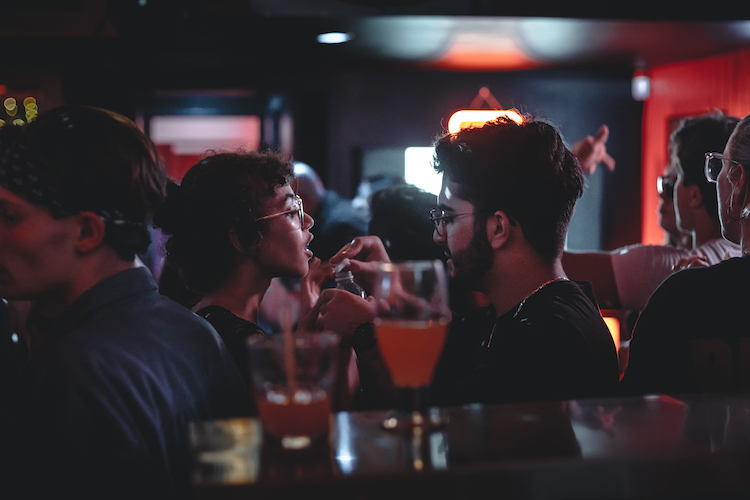
Two people talk over drinks at bar Nacho Libre, in Beaubien. Photo by Ivan de Jacquelin.
Peltier says the city will also start brainstorming other ideas linked to the extension of Montreal nightlife.
“For now we’re aiming at temporary exemptions for specific events, then we will see how we’re able to bring that project towards other types of extensions,” he says.
Peltier also mentioned that once the Nightlife policy goes public, it will still be up to the boroughs to decide separately if they want to implement it.
According to the project’s roadmap unveiled last year, the Nightlife Policy should be disclosed before the end of Summer, 2023.
